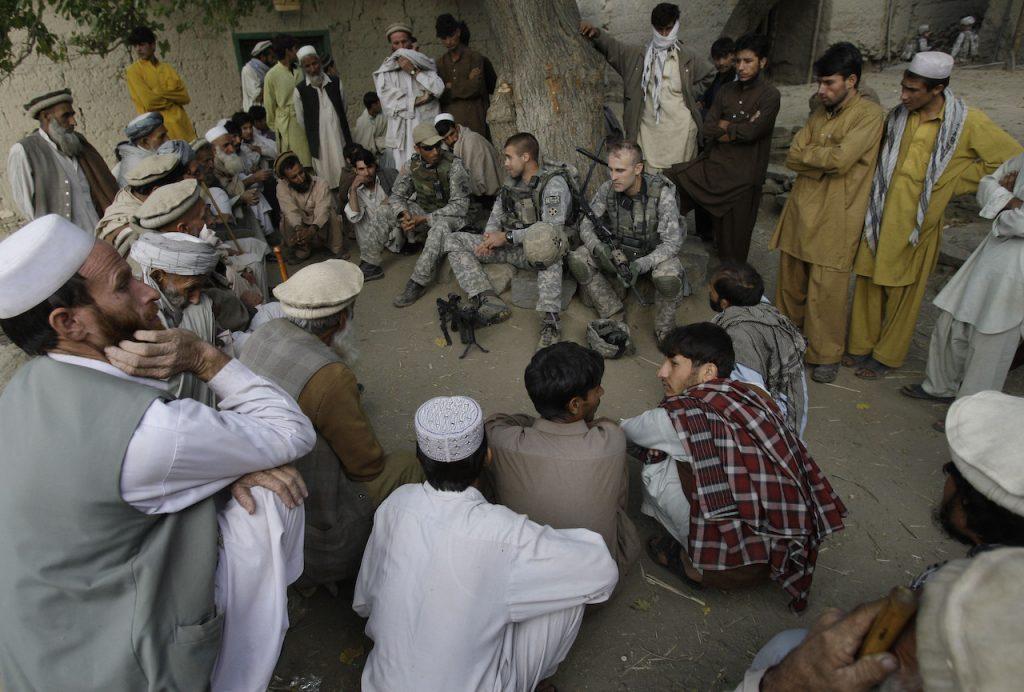US to evacuate Afghan interpreters as Taliban seize border town
The interpreters and their families are likely to be taken first to US overseas military bases or possibly third countries before resettlement in the US or elsewhere.
Just In
Thousands of interpreters who aided US and Nato forces in Afghanistan will be evacuated beginning in late July, Washington announced Wednesday, as Taliban insurgents captured a strategic crossing on the Pakistan border from government forces.
In what the White House dubbed Operation Allies Refuge, the interpreters and their families are likely to be taken first to US overseas military bases or possibly third countries before resettlement in the US or elsewhere.
Many fear retaliation by the Taliban, who are seeking to regain control of the government in Kabul after the departure of US troops before the end of August.
There are an estimated 18,000 people – interpreters, translators, and others who worked with US forces – who would qualify for evacuation. With their families, it could potentially take the total number of evacuees to 80,000 or more.
White House press secretary Jen Psaki said the goal is to get those already being processed under the State Department’s special immigrant visas programme, only a portion of the 18,000, out by the Aug 31 deadline for the US withdrawal.
“These are courageous individuals. We want to make sure we recognise the value of the role they played,” she said.
At the Pentagon, spokesman John Kirby said they were working intensely on where the translators would be sent, but he would not identify any possibilities.
“We’re looking at all options,” he said.
Fighters on motorcycles
The news came as the US military pushed forward with the final tasks of withdrawing from the country, and as the Islamist insurgents captured Spin Boldak, the border crossing on the main highway between Kandahar and Quetta, Pakistan, and continuing onward to Karachi.
Afghanistan’s interior ministry denied the insurgents had taken the area.
“The terrorist Taliban had some movements near the border area… The security forces have repelled the attack,” interior ministry spokesman Tareq Arian told AFP.
But social media was flooded with pictures of Taliban fighters relaxing in the frontier town, and residents told AFP it was in the Taliban’s hands.
“I went to my shop this morning and saw that the Taliban are everywhere. They are in the bazaar, in police HQ and custom areas. I can also hear the sound of fighting nearby,” said Raz Mohammad, a shopkeeper who works near the border.
The border crossing provides direct access to Pakistan’s Balochistan province – where the insurgents’ top leadership has been based for decades – along with an unknown number of reserve fighters who regularly enter Afghanistan to help bolster their ranks.
Hours after the crossing fell, an AFP reporter on the Pakistani side saw around 150 Taliban fighters riding on motorcycles, waving insurgent flags and demanding to be allowed to cross into Afghanistan.
Bush blasts US withdrawal
Spin Boldak was the latest in a string of border crossings and dry ports seized by the insurgents in recent weeks as they look to choke off revenues much-needed by Kabul while also filling their own coffers.
In another sign Western governments were rapidly reassessing the situation, British Defence Secretary Ben Wallace said the UK was prepared to work with the Taliban if it enters into a power-sharing government.
“Whatever the government of the day is, provided it adheres to certain international norms, the UK government will engage with it,” he told the Daily Telegraph.
“All peace processes require you to come to terms with the enemy. Sometimes, that’s what it is.”
On Tuesday the Pentagon pressed the leaders in Kabul to step up their fight against the Taliban.
“They know what they need to do,” Kirby told reporters. “Whatever the outcomes are, good or bad, it’s going to come down to how leadership was exuded, how leadership was demonstrated,” he said.
“That’s really going to be the test here in the coming weeks and months.”
As the government’s grip over the country appeared to further loosen, former US president George W Bush – who launched the US invasion 20 years ago after the Sept 11 attacks – slammed Biden’s decision to withdraw all troops.
“I’m afraid Afghan women and girls are going to suffer unspeakable harm… They are going to be left behind to be slaughtered by these very brutal people and it breaks my heart,” he told German broadcaster Deutsche Welle.
Asked whether he thought the withdrawal was a mistake, Bush replied: “Yes, I think it is.”
Meanwhile nearly 350 Afghans fled into Tajikistan Wednesday from northern Afghanistan to escape attacks by the Taliban, the Tajik news agency Khova reported.
It said the refugees, a majority of them girls, had “fled from the Taliban to save their lives”, adding that two babies died during the border crossing.
Subscribe to our newsletter
To be updated with all the latest news and analyses daily.
